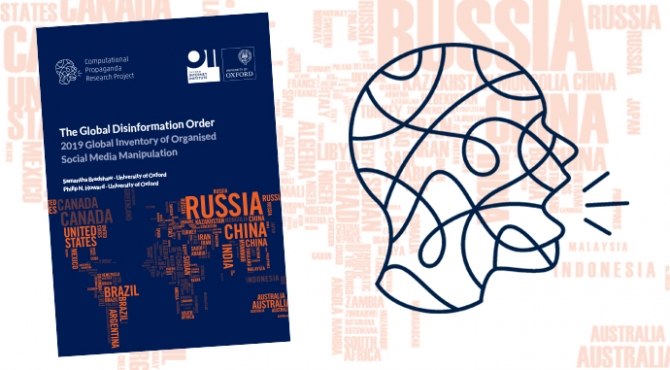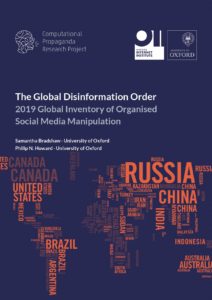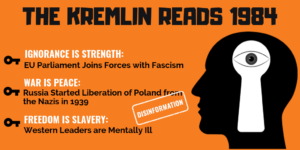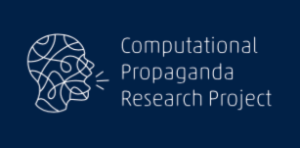
Oxford Internet Institute’s Project on Computational Propaganda
Organized social media manipulation has more than doubled since 2017, with at least 70 states employing computational propaganda to shape public opinion, according to a new analysis.
In Vietnam, citizens were enlisted to post pro-government messages on their personal Facebook pages. The Guatemalan government used hacked and stolen social media accounts to silence dissenting opinions. Ethiopia’s ruling party hired people to influence social media conversations in its favor, The New York Times reports:
Despite increased efforts by internet platforms like Facebook to combat internet disinformation, the use of the techniques by governments around the world is growing, according to a report released Thursday by researchers at Oxford University. Governments are spreading disinformation to discredit political opponents, bury opposing views and interfere in foreign affairs.
“Social media technology tends to empower propaganda and disinformation in really new ways,” said Samantha Bradshaw, a researcher at the Oxford Internet Institute, a department at Oxford University, and co-author of the study, “The Global Disinformation Order 2019: Global Inventory of Organised Social Media Manipulation.”
 The researchers said “sophisticated state actors” from at least seven countries – China, India, Iran, Pakistan, Russia, Saudi Arabia and Venezuela – are working outside their borders on global foreign influence operations, using Facebook and Twitter, AFP adds.
The researchers said “sophisticated state actors” from at least seven countries – China, India, Iran, Pakistan, Russia, Saudi Arabia and Venezuela – are working outside their borders on global foreign influence operations, using Facebook and Twitter, AFP adds.
“The manipulation of public opinion over social media remains a critical threat to democracy, as computational propaganda becomes a pervasive part of everyday life,” said Philip Howard, director of the British-based institute. “Although propaganda has always been a part of politics, the wide-ranging scope of these campaigns raises critical concerns for modern democracy.”
Some 26 authoritarian states use computational propaganda to control information, suppress public opinion and press freedom, discredit critics, and suffocate political dissent. And in at least 45 democracies, politicians and political parties use similar tools to attract fake followers or spread manipulated media to cultivate voter support.
When it comes to disinformation, Facebook is the No. 1 platform for governments and political parties seeking to manipulate public opinion. But while Facebook remained the most popular platform for social media manipulation due to its size and global reach, Reuters adds, a focus on visual content more likely to be shared online means users of Google’s YouTube video platform and Facebook’s Instagram photo-sharing site are increasingly being targeted with false or misleading messages, said Bradshaw.
“On Instagram and YouTube it’s about the evolving nature of fake news – now there are fewer text-based websites sharing articles and it’s more about video with quick, consumable content,” she said. “Memes and videos are so easy to consume in an attention-short environment.”

EU vs Disinfo
The report, which analyses trends in computational propaganda and evolving tools, capacities, strategies, and resources, cites the following main findings:
1. Evidence of organized social media manipulation campaigns which have taken place in 70 countries, up from 48 countries in 2018 and 28 countries in 2017. In each country, there is at least one political party or government agency using social media to shape public attitudes domestically.
2. Social media has become co-opted by many authoritarian regimes. In 26 countries, computational propaganda is being used as a tool of information control in three distinct ways: to suppress fundamental human rights, discredit political opponents, and drown out dissenting opinions.
3. A handful of sophisticated state actors use computational propaganda for foreign influence operations. Facebook and Twitter attributed foreign influence operations to seven countries (China, India, Iran, Pakistan, Russia, Saudi Arabia, and Venezuela) who have used these platforms to influence global audiences.
4.  China has become a major player in the global disinformation order. Until the 2019 protests in Hong Kong, most evidence of Chinese computational propaganda occurred on domestic platforms such as Weibo, WeChat, and QQ. But China’s new-found interest in aggressively using Facebook, Twitter, and YouTube should raise concerns for democracies
China has become a major player in the global disinformation order. Until the 2019 protests in Hong Kong, most evidence of Chinese computational propaganda occurred on domestic platforms such as Weibo, WeChat, and QQ. But China’s new-found interest in aggressively using Facebook, Twitter, and YouTube should raise concerns for democracies
5. Despite there being more social networking platforms than ever, Facebook remains the platform of choice for social media manipulation. In 56 countries, we found evidence of formally organized computational propaganda campaigns on Facebook. RTWT
China has become a disinformation superpower by using propaganda on social media to influence world opinion and events, according to the Institute. The pro-democracy protests in Hong Kong were the catalyst for Beijing’s increase in social media campaigns as it tried to brand democracy advocates as violent radicals.
“China has become, what we’re calling, a global disinformation superpower,” said Howard. “It’s flexed its muscles, it’s clearly operating on multiple platforms, it’s targeting voters in the west for their opinion.”

East StratCom Task Force
“The Russians have been the most creative and persistent at using social media to manipulate public opinion, but they’ve been targeting many countries over many years. We thought the Chinese had the capacity but it’s only recently that they’ve been doing as much as the Russian government has.”
“Since 2016 we’ve almost got used to the notion that the Russians will try to contribute to public conversation during elections, and now it may be the Russians and Chinese that weigh in on public conversations over social media when the UK votes, maybe early next year or during the US elections, Canada is voting in a month.”
Talking of which ….
This week’s Disinformation Review from the East StratCom Task Force contains pro-Kremlin disinformation attacks in almost all possible directions, including the European Parliament, Estonia, Lithuania and the Czech Republic. Poland is, of course, a target. The Kremlin’s Polonophobia shows no signs of receding – roughly one out of ten cases this week is devoted to Poland, suggesting, for instance, that it was Poland’s fault that Stalin attacked the country. Or that current Poland wants to dictate its will to EU. Ukraine and the US is also attacked; the US supporting ISIS terrorists; Ukraine applying to be a US State and generally being Nazi.
 The report is likely to dispel any remaining illusions about the democratizing potential of “liberation technology,” observers suggest.
The report is likely to dispel any remaining illusions about the democratizing potential of “liberation technology,” observers suggest.
“Although social media was once heralded as a force for freedom and democracy, it has increasingly come under scrutiny for its role in amplifying disinformation, inciting violence, and lowering trust in the media and democratic institutions,” said Bradshaw, the report’s lead author.







